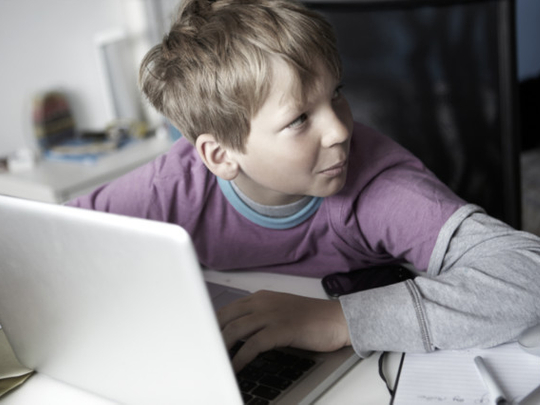
Abu Dhabi: Twelve-year-old Akshay has a dual Facebook account – one that his parents know of and the other he uses secretly to communicate with friends.
“I knew my dad was snooping on me. It’s embarrassing. You know, the stuff we talk about with friends. I did not want him to keep an eye,” a seventh grader at a British school in Abu Dhabi told XPRESS on condition of anonymity.
Akshay is just one of hundreds of schoolchildren who have a secret online life their parents know nothing about.
From twin Facebook profiles to secret e-mail accounts, anonymous Google Plus and Messenger IDs, these tech savvy youngsters zealously guard their online space from the prying eyes of their parents.
Leah, a ninth grade student from Lebanon, said she stopped mixing family with friends on social media after a bad experience. “All hell broke loose when my parents discovered I was using swear words and discussing boys. They asked for my Facebook password and also demanded to see my Whats App messages,” said Leah.
Celine, 14, a Canadian student in Abu Dhabi, said she set up an anonymous Google Plus account after her parents accessed her chat history on Facebook.
Most parents said they are unaware whether their children have a secret online life. “My 12-year-old son thinks I am snoopy,” said Canadian father Kevin. “It worries us because I do not know what keeps him occupied on the net for five-six hours.”
Parents said the toughest part is to strike a balance between not being intrusive and keeping watch.
“We do not want them to think that we distrust them. But we want to protect them from the dangers lurking out there,” said Amina Hussain, an Indian mother of two teenage girls in Abu Dhabi.
According to psychologists, children who have secret online lives are unlikely to have an open and trusting relationship with parents.
Dr Amy Bailey, Clinical Psy-chologist at Kids First Medical Centre in Dubai, said, “Children are more likely to be more secretive as they approach adolescence. It is natural for teenagers to be less dependent on their parents and be less open with them. It is often more important for them to gain acceptance by peers than by their parents.
“I think you need to talk openly to your child about the risks and why you have safeguards in place – it is not about not trusting them, it is about ensuring their safety. This should include conversations about the permanence of the online world and the possible impact of inappropriate messages and images in the future (e.g. college application, jobs).”
Ali Alamadi, head of the Information Security Awareness Committee at the Higher Colleges of Technology, advises parents against closely monitoring children.
“Most kids are sensitive and value privacy. They don’t like parents poking their noses into their private life,” said Alamadi.
According to him, there is a huge generation gap when it comes to technological awareness between parents and children.
“Most parents don’t know even half of what their children know. When parents don’t understand technology, how can they talk to their children about it?”
Elaborating on the potential dangers children get exposed to on the internet, he said children are soft targets for hackers and predators to steal confidential information. “Children are naïve and they will easily click on any links sent to them, and try to download stuff,” he said.
The network of unknown friends children build gets bigger and bigger through friends’ friends list. “A predator can easily reach multiple targets through one child he manages to befriend. Things really get out of hand when a child decides to meet an online friend without telling their parent,” warned the expert.
Cyber bullying, access to inappropriate content, sex predators – the web opens a world of threat to children who go on a free reign.
Mohammad Mustafa Saidalavi, CEO and founder of the DISC Foundation, an India-based NGO working against online abuse of children, says schools have an important role in reinforcing the messages parents are conveying at home in terms of appropriate and safe internet usage.
“One of the policy reforms DISC is proposing is to establish a certification programme for UAE schools to become an Internet Safe School by implementing safer internet policies, helpdesk/reporting tool and safety framework,” said Saidalavi.
(Names of children changed to protect their identity)
You speak:
Have you ever caught your child with a secret Facebook account? How did you deal with it?
Write to us at:
editor@xpress4me.com
www.xpress4me.com
sms 5101












